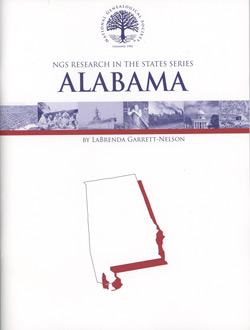Alabama – a NGS Research in the States Guide; by LaBrenda Garrett-Nelson JD, LLM, CG, CGL; 2021; Soft Cover; Saddle Stapled; 54 pages (48 numbered), NGS Special Publication Number 136; ISBN: 978-1-935815-48-8; Item#: NGS41; $20
Alabama has a long, rich, and complex history. Indigenous Americans populated and then mysteriously abandoned a large mound settlement in present-day Moundville (circa 1000 CE to 1450 CE). During pre-colonial times, Cherokee, Chickasaw, Choctaw, and Creek tribes claimed the territory. The French, English, and Spanish ruled at various times in its colonial period. The first enslaved people were brought to the territory in 1721. On 14 December 1819, Alabama became America’s twenty-second state. LaBrenda Garrett-Nelson, JD, LLM, CG, CGL, author of Research in Alabama, provides family history researchers a comprehensive overview of the resources available to help them trace their ancestors through the centuries.
Archival records begin in 1702 when part of present-day Alabama was settled by the French. During the colonial era and into the early 1800s, travelers needed “land passports” to travel to or through areas controlled by Native Americans or foreign governments. Following the War of 1812 and the 1813–1814 Creek War, the territory saw a steady increase in its population, drawing settlers from Georgia, North Carolina, South Carolina, and Virginia. In the early nineteenth century, as Native American tribes were being driven out of the state, the number of enslaved people increased. By 1860, Alabama’s enslaved population had grown to 435,080. On 11 January 1861, Alabama became the fourth state to vote to secede from the Union. Weeks later it joined the Confederacy.
Research in Alabama provides genealogists with information about valuable resources, including:
- Archives, Libraries, and Societies
- Atlases, Gazetteers, and Maps
- Bible, Cemetery, and Census Records
- Court and other Jurisdictional Records
- Directories and Newspapers
- Ethnic, Institutional, Military, Probate, and Religious Records
- Land Records, including Public Lands, Homesteads, and Military-Bounty Land Warrants
- Naturalization, State, Tax, Vital Records, and more
- The guidebook includes the website address, physical address, and telephone number for each repository.
No discussion of Alabama’s genealogical resources would be complete without a review of archival documentation regarding the state’s enslaved people and its free people of color. Research in Alabama includes information on pertinent digital collections and databases such as bills of sale, estate inventories, letters, etc. at various repositories in Alabama and online. Garrett-Nelson also covers non-traditional repositories such as Ancestry’s collection of images of Episcopal Church records from Alabama that contain records of baptized enslaved infants and adults. The author provides an overview of postbellum records including the Freedman’s Bureau records from 1865-1872; Southern Homestead Act of 1866 that allowed Freedmen to purchase public land; voter registration books; and records from the Freedman’s Bank.
Alabama was one of the few states to grant property rights to married women prior to the Civil War. Historical records of testamentary documents, deeds, bills of sale, and more offer a possible pathway for tracing maternal ancestors. Also discussed in the guidebook are the records created during and immediately after Civil War, including less well-known resources such as the 1862 Salt Vouchers and the Southern Claims Commission for Southern Loyalists. These topics and more are thoroughly addressed in Research in Alabama.
Published by NGS, Research in Alabama is one volume in the Research in the States series edited by Barbara Vines Little, CG, FNGS, FUGA, FVGS.
To see a full Table of Contents and/or to order, see: https://www.familyrootspublishing.com/store/product_view.php?id=3847
